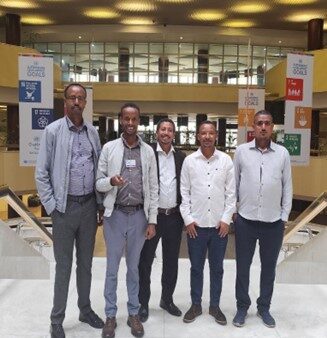In a significant step forward for academic engagement in African energy planning, Jimma University has become the first institution to join the EMP-A 2025 Scholars’ Bootcamp. This marks the beginning of a new track within the Energy Modelling Platform for Africa (EMP-A), designed specifically for universities and research centres that want to generate cutting-edge, policy-relevant analysis through hands-on training and collaboration.

What is the Scholars’ Bootcamp?
The Scholars’ Bootcamp is a new way to participate in an EMP-A initiative that supports interdisciplinary university teams across Africa to produce publishable research papers during and after their training. These teams receive in-depth instruction on leading open-source energy modelling tools while working on real-world research challenges relevant to their country and region.
A Strong Start: Jimma University’s Team
The pioneering team from Ethiopia comes from the Renewable Energy Research, Development and Training Centre at Jimma University Institute of Technology. The Centre is highly active in both higher education and capacity development, working closely with the Ethiopian Electric Utility, Ethiopian Electric Power, Ethiopian Ministry of water and Energy and other national stakeholders. Their staff includes faculty members, researchers, and trainers engaged in mentoring, leadership and technical capacity building, and utility partnerships.
Through the Bootcamp, the Ethiopian cohort is developing a national energy model that combines refined energy demand projections (based on the MAED tool)—including the modelling of biomass energy, which is central to Ethiopia’s energy mix—with an improved supply-side analysis (based on OSeMOSYS). This dual-track approach is intended to support both academic research and national policy dialogues.
How International Support Can Help
The team from Jimma University Institute of Technology has identified three key areas where international collaboration could be transformational:
- Data Access
Support in obtaining high-quality, country-specific data from international organizations such as AFREC, IRENA, and MECS, especially in areas like clean cooking and biomass, where data gaps remain critical. - Research Feedback
Opportunities for peer review and expert feedback on ongoing modelling work to improve methodological rigour and enhance the quality of their research outputs. - Academic Networking
Integration into wider academic networks like the Energy Modelling Community (EMC) and AISESA to foster cross-country collaboration and enable joint research grant applications.
Future Collaboration Areas
The team at Jimma University is also laying the groundwork for deeper regional and thematic research. Two key areas of future interest include:
- Regional Power Interconnectors: Using tools like OSeMOSYS to model Ethiopia’s growing role in regional electricity exports, particularly to Kenya and Tanzania.
- Green Hydrogen Strategy: Exploring pathways for Ethiopia to develop a national green hydrogen strategy aligned with regional decarbonization goals.
Looking Ahead
This first Ethiopian Scholars’ Bootcamp cohort isn’t just learning tools—they’re building bridges: between academia and government, between local needs and regional integration, between today’s models and tomorrow’s strategy.
With a strong foundation, a motivated team, and growing institutional partnerships, Jimma University’s participation in the Scholars’ Bootcamp is more than a training exercise—it’s a signal of Ethiopia’s readiness to lead on energy planning in Africa.
Their message is clear: let’s work together, not alone. Whether it’s through data sharing, peer exchange, or collaborative funding, they’re ready to help create a continental energy map—one built by Africans, for Africa.
